And now back to that train wreck in progress....NY...sigh
'Traction Is Building' For New Marijuana Bill, But Will Cuomo Support It?
The on-again, off-again effort to legalize marijuana in New York is picking up new momentum, after state lawmakers unveiled a revised legislative package aimed at winning over weed skeptics, social justice advocates, and most crucially, Governor Andrew Cuomo.
The amended
Marijuana Regulation and Taxation Act, released by State Senator Liz Krueger and Assembly Majority Leader Crystal D. Peoples-Stokes on Friday, closely resembles the framework put forth by the governor earlier this year. That proposal was
dropped from the budget agreement in April, and with the session set to end next month, the prospects for legalization looked bleak. But the bill's sponsors say new compromises could push legalization over the finish line in the next few weeks.
"I think traction is building," Krueger told Gothamist on Tuesday. "When it didn't make it in the budget some people thought that meant goodbye. But we took awhile to put a new bill together that reflects what grew out of discussions with colleagues in both houses, and discussions with the governor."
As conceived in the governor's proposal, the amended law would create a Cuomo-appointed Office of Cannabis Management to regulate both recreational and medicinal marijuana, as well as hemp products like CBD. Taxes on the drug would be upped to $1 per gram, and the state would commit to spending $3 million over three years on training police officers to spot stoned drivers. Under the amended bill, the amount of marijuana a person can legally possess would decrease to three ounces, down from the previous version's threshold of two pounds. The age for adult use is set at 21.
But the revised package also includes concessions to advocates on the left, some of whom have been pushing for a more justice-oriented approach to legalization. The bill stipulates that 50 percent of all marijuana revenue would be deposited in a grant reinvestment fund for communities "disproportionately affected by past federal and state drug policies." Those communities would also have access to "incubator programs" offering loans and assistance in joining the potentially lucrative market. And New Yorkers would be able to grow up to six marijuana plants for personal use.
Moreover, new language in the bill would expunge the records of New York residents convicted of low-level marijuana offenses. Previous proposals had called for those records to be sealed, meaning they could still be accessed by members of law enforcement in certain situations.
This change earned plaudits from a coalition of public defender groups on Tuesday, who noted in a press release that marijuana arrest records have "curtailed the opportunities of countless predominately young Black and Latinx New Yorkers." In the first three months of this year, black and hispanic people accounted for
92 percent of low-level marijuana arrests in the city.
According to Melissa Moore of the Drug Policy Alliance, the challenges of record-clearing have been among the biggest lessons gleaned from watching other states go through the legalization process. "Any efforts to address records must be as robust and comprehensive as possible," she told Gothamist. "It's beneficial, as we're going into the ending sprint of sessions, to be starting from a place that takes into account some of the concerns that members voiced during the budget process."
But as advocates framed the new updates as a worthy compromise, the governor has yet to give any indication that he is ready to re-prioritize marijuana legalization.
"I just don't believe—and the senators say—they don't have the votes, and at the end of the day, if you don't have the votes, you don't have the votes," Cuomo told WNYC's Brian Lehrer on Tuesday morning.
Democratic leaders in the senate say they've made no such declaration. Several senators
previously told Gothamist/WNYC that they were waiting to see the revised bill before making a final decision; those lawmakers are presumably still pouring over the 109-page document that dropped on Friday.
According to the bill's sponsors, the votes for legalization are out there, though they may be contingent on Cuomo's support.
"I have no crystal ball. But the situation would need to be as follows: the Assembly passes the bill, the governor offers full-throated support, and then the Senate can hopefully pull it together," predicted Krueger. "I need [Governor Cuomo] to come out with strong support for the package, and I don't think we've heard that yet."
Asked why the governor might not work with fellow Democrats on their final push for marijuana legalization this year, Krueger replied, "I never try to make assumptions about why Andrew Cuomo does anything."
A spokesperson for the Governor's Office did not respond to Gothamist's inquiries about his position on the revised bill.
Cuomo cites marijuana legalization as a top priority
Governor outlines 10 lingering issues the Legislature should tackle this session
ALBANY — Gov. Andrew M. Cuomo began lowering expectations on Tuesday for what state lawmakers may accomplish before leaving Albany on June 19.
The governor outlined an aggressive to-do list for the final four weeks of the legislative session, including legalization of marijuana and allowing driver's licenses for undocumented immigrants. Cuomo also cast doubt on whether the state Senate shares his commitment.
"They have work to do," he told
WAMC News on Tuesday, claiming they are blocking a majority of his agenda.
Senate Democratic spokesman Mike Murphy responded that the governor's critique "is not based in reality," and he noted that the chamber had adopted a host of big-ticket, liberal items in the first five months of the legislative session.
"In this age of Trump, Democrats should work together to make New York a progressive beacon not tear each other down in silly political games," Murphy said.
The aggressive tact by the governor allows him to simultaneously apply pressure on state senators, who might be squeamish about far-left legislation, and provide political cover if his priorities aren't enacted.
A Capitol insider, speaking on the condition of anonymity, said the governor's commitment to his agenda can be measured by the amount of political capital he spends in the next four weeks. The latest legislative push hasn't included any rallies, visits to lawmakers' districts or television advertisements, which accompanied previous advocacy efforts by Cuomo.
It's possible Cuomo's support could ramp up in the coming days, as he told WAMC his focus is returning to his legislative agenda "because it's now ripe again."
Cuomo's other high-profile priorities are the legalization of paid surrogacy contracts, creating a lower threshold for workplace sexual harassment, expanding the use of artificially high wages on construction projects and extending rent regulations in New York City.
Most of the governor's skepticism about legislative action in the final month of the session revolves around recreational adult-use of marijuana, which Cuomo had hoped to address in the
first 100 days of his new administration. But negotiations with state lawmakers stalled and it was
dropped from the final budget.
In an attempt to find common ground with the governor,
Democratic lawmakers amended their proposal on Friday. The new language
mirrors Cuomo's proposal, including the adoption of his idea for an
Office of Cannabis Management.
But
speaking Tuesday on WNYC, Cuomo was less concerned about policy differences, such as whether marijuana-related crimes should be expunged from criminal records or allowing New Yorkers to grow their own marijuana, and more focused on the political challenges facing the legislation.
"The political reality (is) that you don't have the votes in the Senate," Cuomo said.
While Senate Majority Leader Andrea Stewart-Cousins enthusiastically backs legalization, some of her Democratic colleagues — especially those representing suburban communities — have been more cagey about the issue and a majority of senators have yet to publicly support it.
Additionally, reservations have been raised by Assembly Democrats, including members in the Capital Region.
The governor also discounted the possibility of passing additional "ethics reform" measures this year, appearing resigned to the idea that lawmakers wouldn't revisit the issue. He did seem interested, though, in legislation requiring state lawmakers and statewide elected officials in New York to release their tax returns annually.
Cuomo said that he intends to sign a bill approved by the Legislature last week enabling state officials to release copies of the president's state tax returns to certain congressional committees if they are requested. But Cuomo noted that Democrats in Congress had not asked New York to do that, and the Legislature should in turn agree to make their tax returns public, "just to show that they don't have any outside income."
In his summary on Tuesday, Cuomo added that he doesn't believe the Legislature is ready to legalize physician-assisted suicide in New York this session.
New York marijuana: What to know about politics, money and new medical cannabis legislation
Newly reported details of MedMen-related lobbying and political donations targeting key lawmakers, including Savino, underscored how powerful cannabis companies aim to influence New York’s drug laws.
- A $10,300 campaign donation to Savino’s re-election bid last year appears connected to MedMen
- MedMen and affiliates have spent more than $100,000 on lobbying key New York lawmakers since 2018
- New York State Department of Health is currently reviewing MedMen’s merger request with PharmaCann
- Political donations totaling $130,000 linked to MedMen and affiliates have flowed to Gov. Andrew Cuomo
New York’s recreational marijuana battle sits on the front line of a generational war over American cannabis laws. As debate heats up, USA TODAY Network New York is compiling answers to key questions about legalized cannabis.
New York’s medical marijuana program would be overhauled by new legislation removed from the recreational pot debate, but still steeped in cannabis industry political spending.
From expanding patient eligibility to allowing smokable medical marijuana, the bill backed by state Sen. Diane Savino, D-Staten Island, includes many reforms requested by patients and pro-marijuana groups.
Some of Savino’s other changes, however, benefit politically active cannabis companies, despite marijuana opponents suggesting New York lawmakers prioritize lobbying and campaign donations over public health and social equity.
For example, MedMen Enterprises, a California-based cannabis conglomerate, has sought to double the number of dispensaries it owns in New York to eight, but legal hurdles stalled the expansion.
The new MedMen cannabis factory is shown on Wednesday, April 11, 2018 east of Reno-Sparks. The 45,000-square-foot facility includes a 26,000-square-foot greenhouse. (Photo: Jason Hidalgo, RGJ)
Currently, a company can only have four dispensaries under state law, and Savino’s legislation increases the limit to eight.
Newly reported details of MedMen-related lobbying and political donations targeting key lawmakers, including Savino, underscored how powerful cannabis companies aim to influence New York’s drug laws.
PRO: Here's the money behind marijuana legalization push in New York
OPPOSITION: What to know about anti-pot lobbying, pharma, alcohol and tobacco
A Savino spokesman addressed the campaign contributions in a brief statement.
"No contribution to Senator Savino's campaign has any influence on her government and policy decisions," said Thomas Musich, a spokesman for Savino.
MedMen did not answer emailed questions about lobbying and campaign donations for this story.
Both Savino and MedMen issued broad statements about cannabis reforms.
"This legislation is about increasing access to medical cannabis for patients with real needs who have had trouble obtaining a prescription," Savino said.
"In the past, we have proudly supported Sen. Savino and her mission to expand patient access," MedMen officials said. "We strongly believe that a world where cannabis is legal and regulated is safer, healthier and happier."
Cannabis money, politics
A $10,300 campaign donation to Savino’s re-election bid last year appears connected to MedMen. The money flowed through a limited liability company with a California address linked to MedMen, state records show.
The donation to Savino’s campaign was disclosed as MedMan Enterprises USA LLC, a different spelling that makes database searches difficult. But the donation address matched other New York political donations linked to MedMen at the time.
Further, MedMen and affiliates have spent more than $100,000 on lobbying key New York lawmakers, including Savino, since 2018. In addition to various medical marijuana reforms, it has sought to influence the ongoing push to legalize recreational pot for adults, state records show.
The spending is part of
more than $3 million in New York lobbying connected to the cannabis industry since 2013.
MedMen’s New York expansion plan was revealed last year as part of its pending $682 million acquisition of PharmaCann, which owns four New York dispensaries. But the deal stalled due to the four-dispensary ownership cap
first reported by the Albany Times Union.
To understand the stakes, consider that MedMen described its takeover of PharmaCann as the largest acquisition in U.S. cannabis history.
The deal would double the number of states where MedMen has licenses to 12, accounting for over 50 percent of the projected U.S. marketplace, the company reported. It involved 66 retail stores and 13 cultivation and production facilities, including pending acquisitions by MedMen.
The New York State Department of Health, which regulates medical marijuana, is currently reviewing MedMen’s formal merger request with PharmaCann, which they submitted in January, said Jill Montag, an agency spokeswoman.
Yet the new Savino legislation would allow MedMen’s plan to proceed in New York, but it comes amid mounting criticism of out-of-state cannabis businesses taking over marijuana.
Recreational, medical overlap
Gov. Andrew Cuomo in January spoke to public concerns about cannabis industry power when pushing recreational pot legislation.
"We have to do it in a way that creates an economic opportunity for poor communities and people who paid the price and not for rich corporations who are going to come in to make a buck," he said.
Still, political donations totaling $130,000 linked to MedMen and affiliates have flowed to Cuomo, who has changed course on legalizing marijuana after years of opposition. He signed New York’s medical marijuana law in 2014 and introduced recreational pot legislation this year.
Cuomo didn’t respond to an
interview request about why he changed positions on medical and recreational marijuana.
Cuomo’s cannabis legislation, which failed to pass as part of the state budget in April, included key concessions for existing medical marijuana companies in New York.
For example, a key pillar of the governor's social equity plan is a ban on recreational marijuana growers from owning retail pot shops. In theory, this would keep big cannabis corporations from taking over the entire industry.
Existing medical marijuana companies, however, would be exempt from the ban at state regulators discretion, the legislation shows.
That means the companies could start growing and selling recreational marijuana within their system of existing greenhouses and dispensaries.
The potentially lucrative exemption would aid several powerful cannabis industry leaders and raises the stakes for MedMen’s effort to add dispensaries through a takeover of PharmaCann.
MedMen entered the New York market by purchasing Bloomfield Industries, a deal approved by the state Health Department in 2017.
Other mergers
The Health Department previously rejected merger requests submitted regarding Valley Agriceuticals, doing business as Remedy-NY, and Fiorello Pharmaceuticals, doing business as FP Wellness, and running a dispensary in Rochester.
Both companies recently re-submitted their requests, which are currently under review.
Cannabis conglomerate Cresco seeks to merge with Remedy-NY, and Green Thumb Industries, or GTI, with FP Wellness.
At the time of the initial requests, the two companies had insufficient tangible operational assets to sell to the prospective buyers except their registrations, which is prohibited by regulation.
Medical marijuana reforms
In addition to the dispensary limits, Savino’s legislation addresses a range of other high-profile medical marijuana issues.
One is that it would allow medical professionals to use their clinical judgement to certify patients, a significant change from the current law that limits patient eligibility to a list of state-approved health conditions.
Initially, the list of 10 eligible diseases consisted of cancer, epilepsy and other serious illnesses as diagnosed by doctors registered in the program.
Then, as criticism mounted over limited patient access, regulators began expanding eligibility of conditions, such as chronic pain and post-traumatic stress disorder.
As a result, the tally of certified patients has increased steadily to 100,000, which is up from a couple thousand in the beginning of the program in 2016.
Savino’s legislation would maintain a state-sanctioned list of recommended health conditions, but it adds the clinical discretion and expands the eligibility of medical professionals to certify patients, a recommendation of a recent state Department of Health report.
It also removed some of the legal language, such as “serious” and “severe debilitating or life threatening” from the definition of conditions, which would allow for broader medical judgment.
Among other reforms in Savino’s legislation:
- Allows patients to possess up to 60-day supply of the dosage, up from the current 30.
- Permits patients to be certified to use smokable medical marijuana, but they must follow the same restrictions prohibiting tobacco smoking in many public places.
- Establishes a medical marijuana research licensing process to regulate using the drugs for medical and clinical research, as well as other studies.
- It allows companies to set and change the prices, but gives the health commissioner the ability to modify “if necessary to maintain public access to appropriate medication.”
- Establishes designated caregiver facility rules for hospitals and other health-related settings. They would register to assist certified patients with the acquisition, possession, delivery, transportation or administration of medical marijuana.
New Yorkers are drawn to East Coast’s first recreational cannabis dispensaries
For years New York has been known as a city where black-market marijuana can be delivered faster than pizza. But for the past five months, thousands of New Yorkers have been making the two-and-a-half-hour drive to Great Barrington, Mass., to stand on a line typically 70-people long outside the doors of Theory Wellness.
The shop, which opened in 2017 as a medical-marijuana dispensary, launched its recreational-cannabis retail operation Jan. 11, the first such business in Berkshire County to take advantage of a 2016 state ballot initiative that legalized sales of adult-use marijuana. The store has the added distinction of being closer to New York City than any other recreational dispensary in the country.
Being first to market in a town that is already a tourist destination has been a boon to Theory Wellness’s business. In less than five months, its sales have totaled $11 million, the owners say, with half of its 50,000 customers coming from New York state and 25% from the New York metro area. (The proprietors can access ZIP codes—without compromising customer privacy—because state law requires store patrons to submit identification as part of the purchasing process.)
For New Yorkers, visiting the well-stocked dispensary, with its five-page menu of weed strains, edibles and extracts, provides a glimpse of what legalization could look like, should a state bill find enough supporters in the Legislature. Although Gov. Andrew Cuomo included a legalization plan as part of the state budget in January, it became subject to intense debate and was subsequently removed. A new bill that combines some of the governor’s proposal with an earlier bill was introduced just last Friday by its co-author Buffalo Assemblywoman Crystal Peoples-Stokes. Insiders, however, are pessimistic about its chances for passage before the legislative session ends June 19.
Head trip
The crowd in the Theory Wellness parking lot illustrates the appeal of legal cannabis across a broad range of consumers. Great Barrington itself is demonstrating the wider economic impact that legalization can have, as some businesses in the area report a boost to their sales.
"Our business is drawing 1,000 people a day into town, about 90% of whom would otherwise not be here," said Brandon Pollock, chief executive of Theory Wellness, which is independently owned. "You see folks from New York City doing aggressive carpooling, with four or five people packed into a Zipcar."
That figure of a thousand people applies mainly to weekends and includes some visitors who came along for the ride and did not necessarily purchase weed. Even so, business for the recreational dispensary has so far been double what Pollock and his partners had projected, pushing the dispensary to add more than 40 employees, for a total of nearly 50, to deal with the demand. Several local shops have told him of a ripple effect on their business, with double-digit increases in sales since Theory added recreational offerings.
On a recent Saturday, the line that wound around the side of the parking lot included a handful of city residents as well as visitors from Albany; Saratoga Springs; Glens Falls; Newark, N.J.; Philadelphia; Hartford, Conn.; and Clemson, S.C. All had made the drive exclusively to shop at the dispensary—despite having connections to black market dealers at home. Though they knew they would pay more at a legal shop, they felt it was worth the added expense to be assured a safer product that they could buy in the open.
"I know a dealer, but I don't know where [his product] is coming from," said Steve, a middle-school math teacher in Brooklyn who was making his fourth monthly trip to Theory Wellness.
He planned to buy vape pens and cartridges costing between $200 and $300 that he said would help him relax and ease the pain in his leg from a motorcycle accident. He said he would combine the trip with a stop at the MGM Resorts casino, about an hour away in Springfield, Mass., but would have preferred buying his cannabis at home.
"Why do I have to drive 140 miles to come here?" Steve asked. "I'm just trying to get a little pain management."
For other New Yorkers, the excursion was more like a holiday. Bronx resident Priscilla, who works at a nonprofit for the homeless, had driven up with her husband and planned to stay at a nearby bed-and-breakfast.
"I said, 'Come on, it's legal!'" she recalled. "'We'll spend the whole weekend here, honey!'"
She had learned of Theory Wellness from her son-in-law, whom she said suffers from an anxiety disorder and prefers cannabis to his prescription medicine. Anxiety is not a qualifying condition for a medical-marijuana prescription in New York, so he has been driving up on a regular basis from the city.
Even those who were satisfied with their dealers were looking forward to making a legal purchase.
"We wanted to experience going into a store and being able to shop," said Anthony, an operations manager in Queens who had arranged the weekend trip as a birthday present for his girlfriend. "Usually, with a dealer, there's just one or two options."
The variety, he added, would make up for the higher prices. An eighth of an ounce of smokable weed—"flower" on the Theory Wellness menu—averages $50, plus $10 from the 20% sales tax, compared to black market prices in the city of $25 to $30. Anthony was prepared to spend as much as $350.
"My mother actually wants edibles," he added. "A few people put in orders with us."
Gregory Cherin
Brandon Pollock, CEO of Theory Wellness.
Side effects
Supporters of legalization in New York hope the Massachusetts model serves as a blueprint.
"Clearly there is a legal market for this, just based on what they're doing in Massachusetts," Peoples-Stokes said. "We hope we can convince people there is some value in turning a multibillion-dollar underground market into an above-ground market."
But critics say that Massachusetts is setting the wrong example.
"Any report that says people are rushing across state lines to buy pot doesn't acknowledge the vast majority of the population that isn't clamoring for pot shops in their community," Kevin Sabet, president of Smart Approaches to Marijuana, which has campaigned against legalization, wrote in an email. "New York's leaders should be protecting their communities from this addiction-for-profit industry, not throwing the doors wide open."
Legalization in Massachusetts has not been without controversy. About a third of municipalities have opted to ban recreational dispensaries from opening within their borders. In addition, the slow pace of licensing by the Cannabis Control Commission has led to the collection of just $18 million in marijuana tax revenue through the beginning of May, less than a third of the state's forecast of $63 million for the fiscal year ending in June. The state keeps 17% of the 20% sales tax.
Even Great Barrington, which worked quickly to enact zoning laws to speed the opening of dispensaries, is seeing some pushback as four more shops await state approval to open.
"People are saying, 'It's too many. We're going to be known as Pot Town,'" said Select Board member Ed Abrahams.
But so far the town, at its annual meeting, has voted only to "consider" limits on new dispensaries. Abrahams said that being first to market with Theory Wellness proved to be "a windfall" for Great Barrington.
"I saw a million-and-a-half-dollar advantage to being first," he said of what he expects the town to receive in local taxes on the dispensaries' revenue each year if it continues at its current rate of more than $6 million in quarterly sales. The town collects a 3% tax on sales and an additional 3% community-impact fee, which comes out of the dispensary's pocket and likely will be spent on health, wellness and drug education initiatives.
Others are benefiting too.
"We've seen a double-digit percentage increase in our sales for the first two quarters," said Robin Helfand, owner of Robin's Candy Shop, on the town's Main Street. The increase was "significant," she said, because it encompassed the region's slow period between the end of ski season and the beginning of summer.
Helfand, who distributes coupons to people waiting on the Theory Wellness line, has extended her shop hours, added staff and put in a section of salty snacks that Theory Wellness customers have requested. She is looking forward to another dispensary, Calyx Berkshire, opening directly across the street. Its owner plans to emphasize advance orders, letting shoppers stroll around town until a phone app or buzzer tells them their goods are ready.
If the plan works, it could spread the windfall around.
"It will keep people from blocking the sidewalk," Helfand said. "And it will build business for everyone." ■
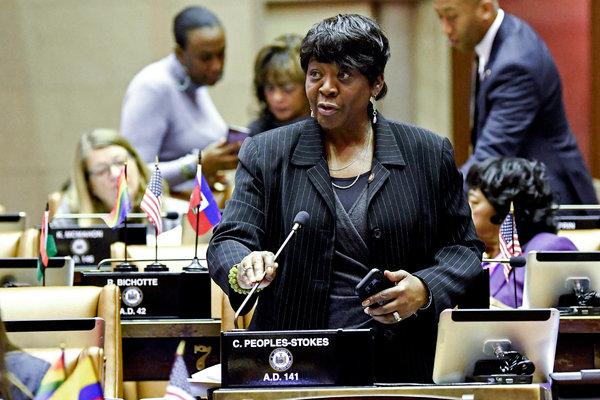
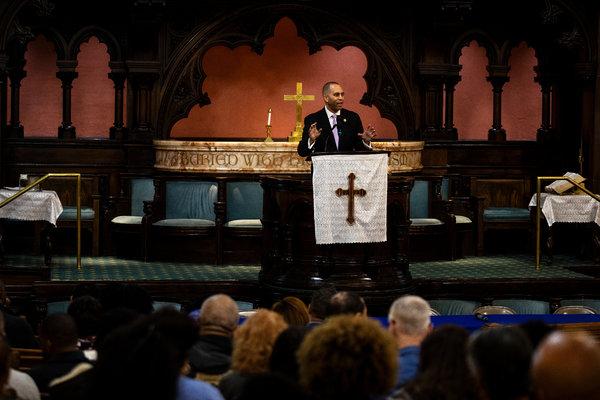
 There is a lot of short sided-ness in the NY GOV.
There is a lot of short sided-ness in the NY GOV. 
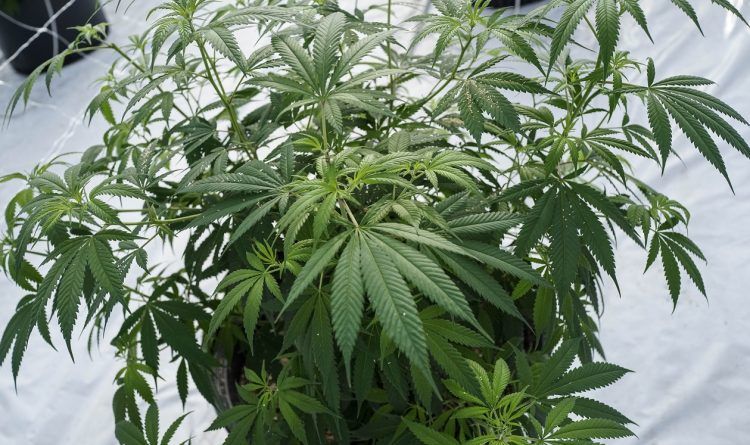
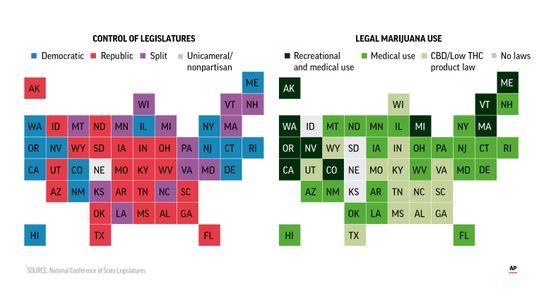

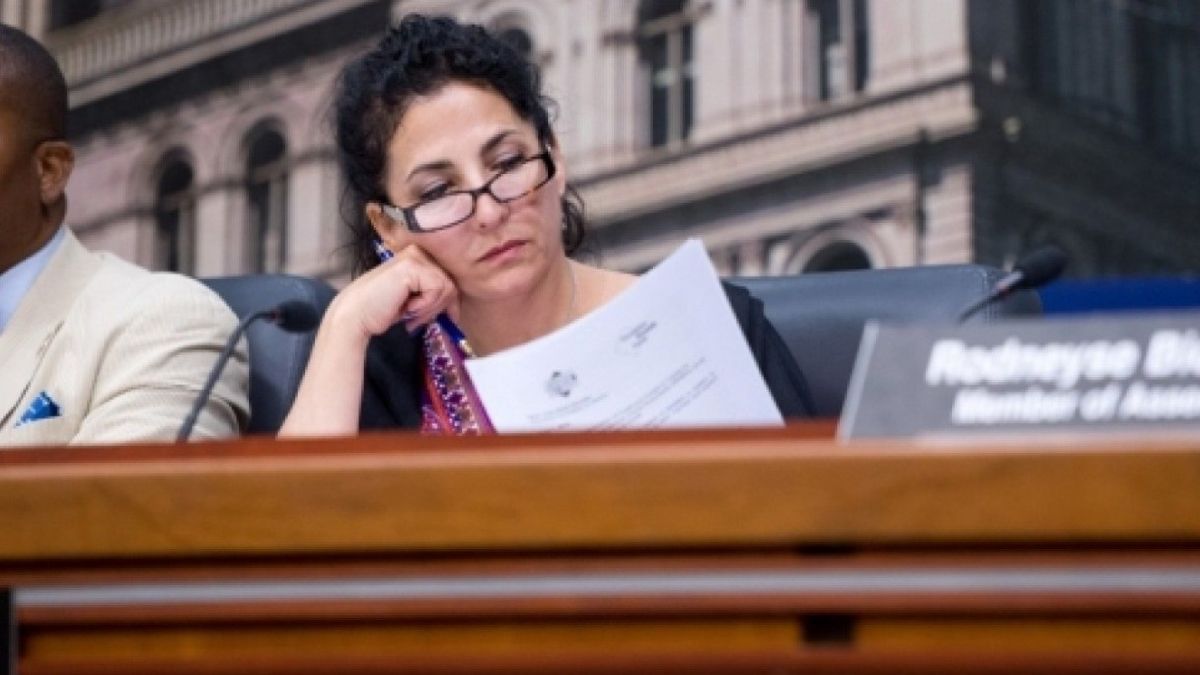
 after every election cycle. There was no clear type of policy when the Guv had his banner made during his presentation.
after every election cycle. There was no clear type of policy when the Guv had his banner made during his presentation. 

